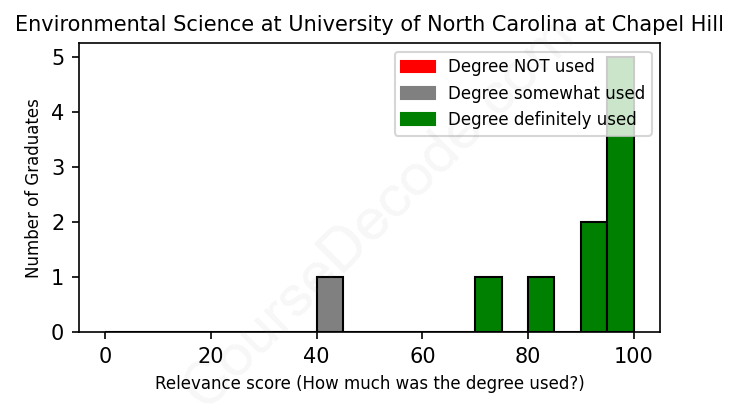
First, some facts. Of the Environmental Science graduates from University of North Carolina at Chapel Hill we've analyzed , here's how many have used (or NOT used) their degree in their career:

These are estimates based on AI analysis of 10 LinkedIn profiles (see below).
The verdict? Significantly above average. Overall, with an average relevance score of 87%, Environmental Science graduates from University of North Carolina at Chapel Hill have a much higher likelihood (+20%) of finding work in this field compared to the average graduate across all fields:
And for comparison, here's the chart for all profiles we've looked at across all degrees.
Also, after graduating, 40% of these graduates have pursued further education other than another Bachelor's degree (such as a Masters degree or other), compared to the average across all profiles of 35%. This suggests you may need more than just a Bachelors degree to be competitive as a Environmental Science graduate.
See the details:
|
Relevance score: 91% We think this person has gone into a career highly relevant to their degree. We think this person has gone into a career highly relevant to their degree.
DEGREE INFOGraduated in 2015 from University of North Carolina at Chapel Hill with a Bachelor of Science - BS in Environmental Science. No other secondary education since. JOB HISTORY SINCE GRADUATIONRemote Sensing Research Assistant East Carolina University Mar 2015 - Jun 2015 GIS Help Desk Assistant  Davis Library Research Hub Jan 2015 - Dec 2015 Data Analyst  US Environmental Protection Agency (EPA) Jan 2016 - Dec 2017 Senior Research Data Analyst  Johns Hopkins Bloomberg School of Public Health Feb 2018 - Oct 2021 Crew Member  Flying B Ranch Aug 2021 - Dec 2021 Tour Guide & Dog Yard Staff  Husky Homestead Tours Jun 2022 - Sep 2022 Homestead Manager & Dog Handler  Susitna Adventure Lodge Sep 2022 - Apr 2023 Researcher at NREL Alaska Campus  National Renewable Energy Laboratory Feb 2024 - Present ABOUTI'm a level-headed problem solver and quick-to-learn manager with experience across cultures, workplaces, and ecosystems. I am intentional and detail-oriented, a flexible goal-setter, passionate about care-taking and communication. I believe in accounting for the energy, resources, and health of people and the environment while integrating present, practical context along with anticipated future change. |
The top 10 most common jobs done by the graduates we've analyzed (ranked most common to least) are:
When looking at the job paths of graduates from the University of North Carolina at Chapel Hill with a degree in Environmental Science, it’s clear that many have found roles that are quite relevant to their studies. A significant number of these individuals have gravitated toward positions in environmental technology and sustainability, particularly in companies related to solar energy like Strata Solar. Jobs like Development Project Manager and Project Development Engineer showcase their ability to apply their environmental science skills directly in managing renewable energy projects. Positions at CompostNow also reflect a strong connection to environmental sustainability, focusing on composting and promoting eco-friendly practices.
However, there are also instances where graduates have taken on roles that don't directly relate to Environmental Science. Positions such as Office Administrator and freelance writing positions tend to veer more into general administrative or unrelated fields. While some of these jobs benefit indirectly from environmental knowledge—like analysts in energy sectors—the direct application of their degree can sometimes be lacking. Overall, while there’s a clear trend of graduates pursuing careers that leverage their Environmental Science background, there’s also a variety of job roles that don’t directly relate to the core subject of their degree, indicating a mixed bag when it comes to relevance in their chosen careers.
Here is a visual representation of the most common words in job titles for Environmental Science graduates (this is across all Environmental Science graduates we've analyzed, not just those who went to University of North Carolina at Chapel Hill):

Looking at the career paths of graduates from the University of North Carolina at Chapel Hill with degrees in Environmental Science, it’s clear that many of them are finding meaningful work relevant to their studies right after graduation. A lot of graduates land jobs in environmental sectors, with initial roles often as technicians, analysts, or managers in organizations focusing on sustainability, water quality, or renewable energy. For example, several folks started out as Water Quality Technicians or lab assistants at research institutions, which aligns well with their academic background.
As time goes on, these alumni generally see growth in their careers, often moving into higher-level positions within relevant fields. Many who began in technical roles have transitioned into managerial or even executive positions at companies focused on clean energy or environmental initiatives. For instance, one graduate climbed the ranks at a composting company to become Chief Operating Officer. Others have made their mark at reputable organizations like the U.S. Geological Survey and the EPA. So, it looks like graduates are typically doing pretty well for themselves, carving out strong careers in environmental sectors, rather than straying into unrelated fields. That’s a promising sign if you're considering a career in Environmental Science!
Hey there! When it comes to a Bachelor’s degree in Environmental Science at UNC Chapel Hill, or really just anywhere, it can be a pretty mixed bag. It’s not necessarily the easiest degree out there; you'll be digging into some science-heavy courses like biology, chemistry, and ecology, which can be challenging if science isn’t your strong suit. Plus, there’s often a lot of fieldwork and research projects that require both time and effort. That said, if you're passionate about the environment and enjoy hands-on learning and problem-solving, it can be a rewarding experience. So, while it may not be a walk in the park, with the right mindset, it can definitely be manageable!
Most commonly, in the LinkedIn profiles we've looked at, it takes people 4 years to finish a Bachelor degree in Environmental Science.
Looking at these Environmental Science grads from UNC, it seems like they’ve found some solid job opportunities, especially for their level of experience. The ones working in composting and renewable energy are likely seeing decent salaries given the growing demand in those fields. Roles like Chief Experience Officer and solar developers usually come with good paychecks, especially as they move up in their companies. On the flip side, some earlier roles, like lab tech positions or administrative jobs, might not have been as lucrative. Overall, while there’s a mix of salaries based on specific jobs, many of these grads appear to be doing pretty well in the long run, especially with their upward career trajectories.
Here is a visual representation of the most common words seen in the "about" section of LinkedIn profiles who have a Bachelor degree in Environmental Science (this is across all Environmental Science graduates we've analyzed, not just those who went to University of North Carolina at Chapel Hill). This may or may not be useful:

Here are all colleges offering a Bachelor degree in Environmental Science (ordered by the average relevance score of their Environmental Science graduates, best to worst) where we have analyzed at least 10 of their graduates:
| College | Score | Count |
|---|---|---|
 University of North Carolina at Chapel Hill University of North Carolina at Chapel Hill
|
87 | 10 |
 The Ohio State University The Ohio State University
|
85 | 12 |
 University of Vermont University of Vermont
|
68 | 13 |
 University of Oregon University of Oregon
|
66 | 10 |
 Western Washington University Western Washington University
|
63 | 14 |
 University of Virginia University of Virginia
|
57 | 15 |
 Oregon State University Oregon State University
|
56 | 11 |
 Loyola University Chicago Loyola University Chicago
|
56 | 11 |
 Southern New Hampshire University Southern New Hampshire University
|
53 | 15 |
 University of Phoenix University of Phoenix
|
46 | 15 |
 Florida State University Florida State University
|
45 | 16 |